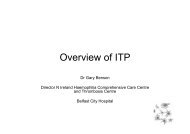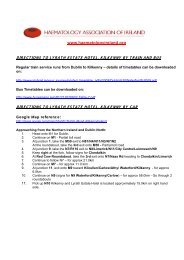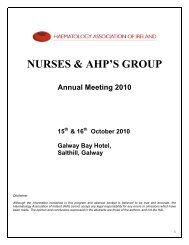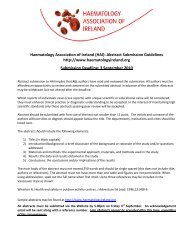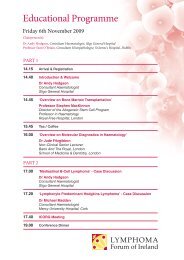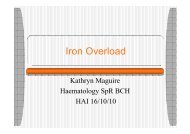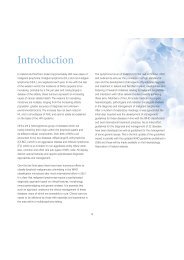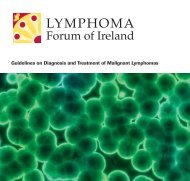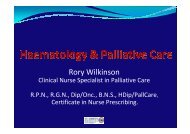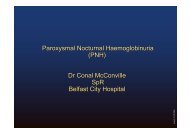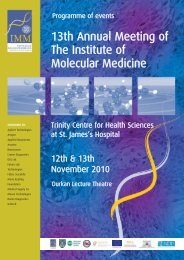Susan Piggott - Haematology Association of Ireland
Susan Piggott - Haematology Association of Ireland
Susan Piggott - Haematology Association of Ireland
Create successful ePaper yourself
Turn your PDF publications into a flip-book with our unique Google optimized e-Paper software.
<strong>Susan</strong> <strong>Piggott</strong><br />
Transplant Co-ordinator<br />
Belfast City Hospital
A Concept Analysis <strong>of</strong> Moral Distress<br />
in the Stem Cell Transplant Setting
The Chosen One<br />
“You are the chosen one /They said / You are the perfect<br />
match /They said…/You can save her life /They said…<br />
I’m so grateful /She said /I need your help /She cried /<br />
Are you sure you want to do it /She asked /I love you so<br />
much / She said …<br />
I don’t want to do it / I thought / My bones are bursting / I<br />
felt / This scares me so much / I thought / No I’m<br />
absolutely fine / I said…<br />
She may not make it / They said / Thanks for your help /<br />
They said.<br />
Just give her more / I thought / She still needs me / I felt<br />
/ What will happen now / I asked<br />
You gave her ten years / They said / We are all so<br />
grateful / They said / I’m empty / I said / A part <strong>of</strong> me has<br />
died too /I thought…
A Concept Analysis <strong>of</strong> Moral Distress<br />
in the Stem Cell Transplant Setting<br />
- Idea / phenomenon / words<br />
- building block <strong>of</strong> theory development<br />
Understanding nursing practice requires clarifying conceptual meaning
A Concept Analysis <strong>of</strong> Moral Distress<br />
in the Stem Cell Transplant Setting<br />
- Formal structured methodology<br />
- Strong philosophical foundations<br />
- Clarifies the abstract<br />
- Can adopt qualitative and empirical elements<br />
- Unpicks the ethics <strong>of</strong> duty / obligation<br />
(deontology), altruism, existentialism,<br />
and utilitarianism
A Concept Analysis <strong>of</strong> Moral Distress<br />
in the Stem Cell Transplant Setting<br />
- Composite term<br />
- Distress with a moral component<br />
- Concerned with core values <strong>of</strong> right and wrong<br />
- Pr<strong>of</strong>ound anguish<br />
- Personal
THINGS<br />
“…It is 5am. All the worse things come<br />
stalking in<br />
And stand icily about the bed looking worse<br />
and worse.”<br />
Fleur Adcock (2000)
A Concept Analysis <strong>of</strong> Moral Distress<br />
in the Stem Cell Transplant Setting<br />
- Conceptual meaning may change across contexts<br />
- Some elements may remain constant<br />
- Potential (TT, health, willingness, estrangement)<br />
- Sibling (familial link)<br />
- SC donor (PB or BM)
Moral Distress in Nursing Contexts<br />
General nursing practice (Pauley et al, 2009)<br />
Advanced nursing practice (Ulrich and Hamric, 2008)<br />
Critical care (van Soeren and Miles, 2003)<br />
Adult setting (Rice et al, 2008)<br />
Paediatric (Austin et al, 2009)<br />
Neonatal settings (Kain, 2007)<br />
Concientious objection (Tiedje, 2000; Caitlin et al, 2008)<br />
Orthopaedic nursing (Erlen, 2001)<br />
Nurses involved in childbirth education (Curl, 2009)<br />
Cancer care (Cohen and Erickson, 2006)<br />
Palliative care (Weissman, 2009)<br />
Primary Care (Laabs, 2007)<br />
Mental health (Austin et al, 2003)<br />
Care <strong>of</strong> the elderly (Bolmsjo, 2006; Rittenmeyer and<br />
Huffman, 2009)<br />
The practice <strong>of</strong> abortion (Hanna, 2005)<br />
Acute care (Elpern, 2005; Laabs, 2007; Rice et al, 2008)<br />
Long term care (Pijl-Zieber et al, 2008)<br />
Psychiatric nursing (Severinsson, 2003)<br />
Non-heart beating organ donation (Mandell et al, 2006)<br />
Non-nursing students (Carpenter, 2010; Range and<br />
Rotherham, 2010)
Sources <strong>of</strong> MD in other contexts<br />
-Futile care<br />
- Competing ethical principles<br />
- Resources<br />
- Power differential<br />
- Conflicting loyalties<br />
- Lack <strong>of</strong> communication<br />
Consequences<br />
- Dissatisfaction<br />
-Anxiety<br />
-Distress<br />
- Burnout
QUESTIONS TO ADDRESS<br />
o What is MD?<br />
o Does MD exist in the context <strong>of</strong> potential sibling SC donors?<br />
o What factors influence the development <strong>of</strong> MD in this<br />
context (the triggers / sources / causes)<br />
o Is there a nursing role in preventing or minimising MD
METHODOLOGY<br />
Stages <strong>of</strong> analysis:<br />
1. Determine the aims or purposes <strong>of</strong> analysis<br />
2. Select concept <strong>of</strong> interest and associated<br />
expressions (surrogate/related terms)<br />
3. Identify all the uses <strong>of</strong> the concept<br />
4. Source and select evidence<br />
5. Determine attributes <strong>of</strong> the concept<br />
6. Establish references, antecedents and<br />
consequences <strong>of</strong> the concept<br />
7. Present a model case - testing tentative criteria<br />
8. Identify related and contrary cases<br />
9. Define the concept<br />
10. Identify implications and recommendations<br />
for practice
METHODOLOGY<br />
Stages <strong>of</strong> analysis:<br />
1. Determine the aims or purposes <strong>of</strong> analysis<br />
2. Select concept <strong>of</strong> interest and associated<br />
expressions (surrogate/related terms)<br />
3. Identify all the uses <strong>of</strong> the concept<br />
4. Source and select evidence<br />
5. Determine attributes <strong>of</strong> the concept<br />
6. Establish references, antecedents and<br />
consequences <strong>of</strong> the concept<br />
7. Present a model case - testing tentative criteria<br />
8. Identify related and contrary cases<br />
9. Define the concept<br />
10. Identify implications and recommendations<br />
for practice
Evidence<br />
� Experience<br />
- those who want to donate and are prevented<br />
- those who do not want to donate and feel obligated<br />
� Culture (blood donors, organ donation) conversations /<br />
newspaper archive / fiction …Factual accounts,<br />
interpretations<br />
� Media pressure (donor registry, headlines)<br />
� Sibling experience
ATTRIBUTES<br />
• Moral wrongdoing<br />
• By choice or by legal, ethical, economic, health<br />
or religious constraints<br />
• Anguish<br />
• Stems from perceived wrongdoing<br />
• Has a moral component<br />
• Moral burden<br />
• Real or perceived moral responsibility<br />
• Constraint<br />
• On moral action<br />
• Restricted autonomy<br />
• Poor resources
ANTECEDENTS<br />
• Moral certainty<br />
• contrasts with moral dilemma<br />
• Selection<br />
• TT health check, gender, ABO, infectious diseases<br />
• Selfishness<br />
• Family dynamics<br />
• greater probability <strong>of</strong> compatibility<br />
• share a history, present and future<br />
• exposure to scrutiny<br />
• May deny moral autonomy<br />
• may intensify moral burden
CONSEQUENCES<br />
• Moral residue<br />
• lingering negative feelings guilt, shame, regret<br />
and failure<br />
• Guilt<br />
• result <strong>of</strong> the perception <strong>of</strong> wrongdoing<br />
• Fractured family relationships<br />
• breakdown in communication and affiliation<br />
• powerful sanctions possible<br />
• Doubt<br />
• A different action, a different outcome?<br />
• Tissue type result
PROPOSAL<br />
The concept <strong>of</strong> MD can be applied when five<br />
distinct conditions are met:<br />
� A specific moral concern is present<br />
� Moral integrity is threatened<br />
� Constraints on action are identified<br />
� Action is perceived as wrongdoing<br />
� Anguish is experienced
CONCLUSIONS<br />
1. Nursing practice may have an impact on the<br />
development <strong>of</strong> MD<br />
2. Constraints that prevent siblings from acting in line<br />
with their moral values can be internal or external,<br />
real, or perceived<br />
3. MD can be prevented or minimised by any<br />
strategies that remove an antecedent or an<br />
attribute
DO I CAUSE MD?<br />
� contributing to the moral burden (group and individual<br />
discussions)<br />
� exposing siblings to selection criteria at a late stage in<br />
a decision making process<br />
� not addressing authority/autonomy imbalance<br />
� not challenging the culture <strong>of</strong> expectation / obligation
CONCLUSIONS<br />
1. Nursing practice may have an impact on the<br />
development <strong>of</strong> MD<br />
2. Constraints that prevent siblings from acting in line<br />
with their moral values can be internal or external,<br />
real, or perceived<br />
3. MD can be prevented or minimised by any<br />
strategies that remove an antecedent or an<br />
attribute
CONCLUSIONS<br />
1. Nursing practice may have an impact on the<br />
development <strong>of</strong> MD<br />
2. Constraints that prevent siblings from acting in line<br />
with their moral values can be internal or external,<br />
real, or perceived<br />
3. MD can be prevented or minimised by any<br />
strategies that remove an antecedent or an<br />
attribute
RECOMMENDATIONS<br />
� Donor counselling PRIOR to tissue typing<br />
� risks, side-effects, complications, health history, moral issues<br />
� Vigilance for values and actions that are not in<br />
synchrony<br />
� Early health assessment (obvious exclusions)<br />
� Non-judgmental approach
CHANGES IN PRACTICE<br />
� Less emphasis on group donor counselling – a more<br />
individualised approach (letter, email, local sampling)<br />
� Advanced nursing role in health assessment<br />
� Algorithm to clarify opt out points (exit<br />
strategies before tissue typing and before<br />
revealing results to pt)<br />
� Values clarification exercise
VALUES CLARIFICATION EXERCISE<br />
Stem Cell Donation - Helping You to Make a Decision<br />
These questions are designed to help you think about what the best course<br />
<strong>of</strong> action is for you. Your answers are entirely private; there is no<br />
obligation to share these thoughts with anyone.<br />
1. What are your beliefs in relation to donation? (I believe that…)<br />
2. What factors would hinder you from donating?<br />
3. What factors would encourage you to donate?
HAI<br />
All about sharing information<br />
<strong>Susan</strong>.piggott@belfasttrust.hscni.net



